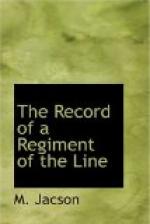Up to this date there had been very little news from the outside world, but now the Regiment was informed that General French had fought a successful engagement at Estcourt and had got in with the cavalry. They were also told that the garrison might expect to be relieved by the 13th December by one division which was coming up from Durban.
About November 22nd the news was received that the armoured train at Colenso had been attacked, derailed, and captured.
On the 23rd Kincaid-Smith received orders to proceed with one of his guns during the following night down to the river-bed near the dummy battery and open fire if the Boers fired at it in the morning. This they had done the previous day, much to every one’s amusement. At daybreak he opened fire from the river-bed. After his second shot the Boers found him and made wonderful practice, bursting shrapnel all over him. No damage, however, was done as he was well dug into the bank. They continued their shelling for an hour, after which they turned their big guns on to Tunnel Hill for a short time. This hill was held by the Liverpool Regiment, who lost two killed and twelve wounded, of whom five died of their wounds next day.
The works on Devon Post and Cemetery Hill were strengthened during the next few nights until the front walls were from twelve to fifteen feet thick. Most of this work was carried on in heavy rain, which greatly added to the general discomfort of the men.
On November 28th the garrison was encouraged by the information that the Boers had been badly beaten near Estcourt, that 3000 of them had gone off (it was not reported where to!), and that General Clery was at Colenso.
On November 30th General Clery opened up signalling communication with Ladysmith by flashing his message with his searchlight at night on to the clouds. The message, which was in cipher, could be easily read by every one, but the garrison was unable to reply as they had no searchlight.
In the early days of December, in order to keep the men as far as possible in a condition for any eventualities, the Regiment evacuated their works twice a week at dusk and went for a march twice round the town. Starting at nightfall the works were regained about 10 p.m. The exercise was good for the men’s limbs and the change of scene undoubtedly nourishment for their minds, but it is doubtful if it conduced to the health of the men, as during the march they were smothered in their own dust, and also in that kicked up by the artillery horses exercising at the same time and on the same roads. It certainly gave the men something to think about besides rocks and stones and building, and the walking stretched their legs.




